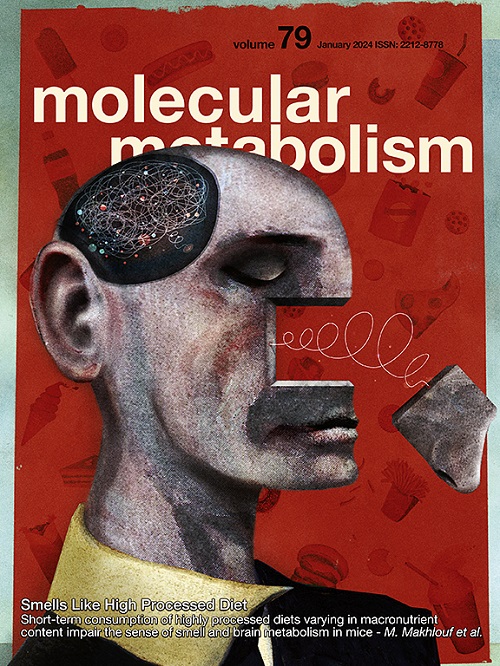BCKDK变构抑制剂对血浆色氨酸脱靶耗竭的影响。
IF 7
2区 医学
Q1 ENDOCRINOLOGY & METABOLISM
引用次数: 0
摘要
支链氨基酸(BCAA)分解代谢的激活作为一种潜在的治疗方法已经引起了人们的兴趣,它可以改善胰岛素敏感性,促进心力衰竭的恢复,并抑制肿瘤的生长。这种兴趣的证据部分依赖于BT2,一种促进BCAA氧化的小分子,对这些病理的小鼠模型具有保护作用。BT2和其他类似物变构抑制支链酮酸脱氢酶激酶(BCKDK),促进BCAA氧化,这被认为是BT2有益作用的基础。然而,BT2潜在的“脱靶”效应尚未被考虑。因此,我们在Bckdk-/-动物中测试了BT2的代谢脱靶效应。正如预期的那样,BT2在这些动物中未能激活BCAA氧化。然而,令人惊讶的是,BT2在对照和Bckdk-/-小鼠中均能显著降低血浆色氨酸水平,并促进色氨酸向犬尿氨酸的分解代谢。机制研究表明,bt2介导的血浆色氨酸降低不需要主要的色氨酸分解代谢酶或犬尿氨酸产生/消耗酶(TDO, IDO1, IDO2或KATs)。相反,通过平衡透析试验和缺乏白蛋白的小鼠,我们发现BT2能有效结合血浆白蛋白并取代色氨酸,释放色氨酸进行分解代谢。这些数据证实,BT2通过抑制BCKDK激活BCAA氧化,但也揭示了通过从血清白蛋白中置换色氨酸代谢的强大脱靶效应。这些数据强调了与白蛋白结合色氨酸竞争的药物化合物的潜在混淆效应。本文章由计算机程序翻译,如有差异,请以英文原文为准。
Off-target depletion of plasma tryptophan by allosteric inhibitors of BCKDK
The activation of branched chain amino acid (BCAA) catabolism has garnered interest as a potential therapeutic approach to improve insulin sensitivity, enhance recovery from heart failure, and blunt tumor growth. Evidence for this interest relies in part on BT2, a small molecule that promotes BCAA oxidation and is protective in mouse models of these pathologies. BT2 and other analogs allosterically inhibit branched chain ketoacid dehydrogenase kinase (BCKDK) to promote BCAA oxidation, which is presumed to underlie the salutary effects of BT2. Potential “off-target” effects of BT2 have not been considered, however. We therefore tested for metabolic off-target effects of BT2 in Bckdk−/− animals. As expected, BT2 failed to activate BCAA oxidation in these animals. Surprisingly, however, BT2 strongly reduced plasma tryptophan levels and promoted catabolism of tryptophan to kynurenine in both control and Bckdk−/− mice. Mechanistic studies revealed that none of the principal tryptophan catabolic or kynurenine-producing/consuming enzymes (TDO, IDO1, IDO2, or KATs) were required for BT2-mediated lowering of plasma tryptophan. Instead, using equilibrium dialysis assays and mice lacking albumin, we show that BT2 avidly binds plasma albumin and displaces tryptophan, releasing it for catabolism. These data confirm that BT2 activates BCAA oxidation via inhibition of BCKDK but also reveal a robust off-target effect on tryptophan metabolism via displacement from serum albumin. The data highlight a potential confounding effect for pharmaceutical compounds that compete for binding with albumin-bound tryptophan.
求助全文
通过发布文献求助,成功后即可免费获取论文全文。
去求助
来源期刊

Molecular Metabolism
ENDOCRINOLOGY & METABOLISM-
CiteScore
14.50
自引率
2.50%
发文量
219
审稿时长
43 days
期刊介绍:
Molecular Metabolism is a leading journal dedicated to sharing groundbreaking discoveries in the field of energy homeostasis and the underlying factors of metabolic disorders. These disorders include obesity, diabetes, cardiovascular disease, and cancer. Our journal focuses on publishing research driven by hypotheses and conducted to the highest standards, aiming to provide a mechanistic understanding of energy homeostasis-related behavior, physiology, and dysfunction.
We promote interdisciplinary science, covering a broad range of approaches from molecules to humans throughout the lifespan. Our goal is to contribute to transformative research in metabolism, which has the potential to revolutionize the field. By enabling progress in the prognosis, prevention, and ultimately the cure of metabolic disorders and their long-term complications, our journal seeks to better the future of health and well-being.
 求助内容:
求助内容: 应助结果提醒方式:
应助结果提醒方式:


